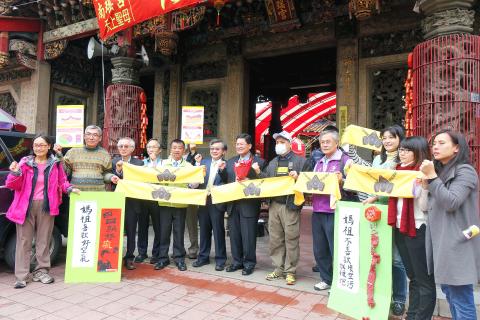Environmentalists yesterday urged Matsu devotees to refrain from setting off firecrackers, or burning incense and joss paper ahead of an annual religious festival next month to reduce air pollution.
Campaigners gathered at Nanyao Temple (南瑤宮) in Changhua City — the first stop of the annual Dajia Matsu Pilgrimage, one of the most celebrated religious activities in Taiwan — and presented a bouquet of flowers to Changhua Mayor Chiu Chien-fu (邱建富), urging people to replace incense and firecrackers with flowers.
Environmentalists measured air pollution levels inside and outside the temple with handheld devices, and recorded concentrations of PM2.5 — particulate matter measuring 2.5 micrometers or less in diameter — of between 50 micrograms per cubic meter and 60 micrograms per cubic meter outside of the temple.

Photo: Liu Shiao-hsin, Taipei Times
However, concentrations of PM2.5 reached more than 200 micrograms per cubic meter near incense burners inside the temple, illustrating the severity of air pollution caused by incense burning.
According to Environmental Protection Administration criteria, PM2.5 levels higher than 54 micrograms per cubic meter are considered hazardous.
Changhua Medical Alliance deputy director Chen Chih-yuan (陳志遠) said during an anti-pollution campaign in Nantou’s Puli Township (埔里) last year that PM2.5 levels were about 15 micrograms per cubic meter, but the level soared to 319 micrograms per cubic meter after a local temple set off fireworks in celebration of the birthday of a god.
“Air pollution caused by religious activities can be more serious than haze in China,” Chen said.
Taiwan Healthy Air Action Alliance founder Yeh Guang-peng (葉光芃) said burning incense generates benzene and polycyclic aromatic hydrocarbons, which can cause respiratory diseases, while particulate matter resulting from incense burning are smaller than bacteria and can easily enter the human body.
Fight for Health Women’s Group executive director Yen Shu-nu (顏淑女) said environmental protection is not in conflict with religions, and replacing ghost money with food offerings or charitable deeds has become a common trend.
“There are 91 temples in the city, but only 15 practice environmentally friendly worshiping. We called on the city office to encourage more temples to follow suit and reduce air pollution,” Yen said.
She said the group asked the city office to monitor air quality during the whole pilgrimage and to make public data collected to serve as a basis for future pollution reduction efforts.
Chiu said the office has instructed temples to reduce the number of incense burners, use fewer and thinner incense sticks and build environmentally friendly furnaces to burn ghost money.
The Changhua County Government has provided temples with electronic firecrackers to reduce the use of traditional fireworks during religious activities, Chiu added.

Taiwan is stepping up plans to create self-sufficient supply chains for combat drones and increase foreign orders from the US to counter China’s numerical superiority, a defense official said on Saturday. Commenting on condition of anonymity, the official said the nation’s armed forces are in agreement with US Admiral Samuel Paparo’s assessment that Taiwan’s military must be prepared to turn the nation’s waters into a “hellscape” for the Chinese People’s Liberation Army (PLA). Paparo, the commander of the US Indo-Pacific Command, reiterated the concept during a Congressional hearing in Washington on Wednesday. He first coined the term in a security conference last

Prosecutors today declined to say who was questioned regarding alleged forgery on petitions to recall Democratic Progressive Party (DPP) legislators, after Chinese-language media earlier reported that members of the Chinese Nationalist Party (KMT) Youth League were brought in for questioning. The Ministry of Justice Investigation Bureau confirmed that two people had been questioned, but did not disclose any further information about the ongoing investigation. KMT Youth League members Lee Hsiao-liang (李孝亮) and Liu Szu-yin (劉思吟) — who are leading the effort to recall DPP caucus chief executive Rosalia Wu (吳思瑤) and Legislator Wu Pei-yi (吳沛憶) — both posted on Facebook saying: “I

Sung Chien-liang (宋建樑), who led efforts to recall Democratic Progressive Party (DPP) Legislator Lee Kun-cheng (李坤城), was released on bail of NT$80,000 today amid outcry over his decision to wear a Nazi armband to questioning the night before. Sung arrived at the New Taipei District Prosecutors’ Office for questioning in a recall petition forgery case last night wearing a red armband bearing a swastika, carrying a copy of Adolf Hitler’s Mein Kampf and giving a Nazi salute. Sung left the building at 1:15am without the armband and covering the book with his coat. Lee said today that this is a serious

A court has approved Kaohsiung prosecutors’ request that two people working for Democratic Progressive Party (DPP) Legislator Lin Dai-hua (林岱樺) be detained, as a probe into two cases allegedly involving her continues. The request was made on Friday, after prosecutors raided Lin’s two offices and the staffers’ residences, and questioned five on suspicion of contravening the Anti-Corruption Act (貪汙治罪條例). The people included the directors of Lin’s Daliao (大寮) and Linyuan (林園) district offices in Kaohsiung, surnamed Chou (周) and Lin (林) respectively, as well as three other staffers. The prosecutors’ move came after they interrogated Lin Dai-hua on Wednesday. She appeared solemn following